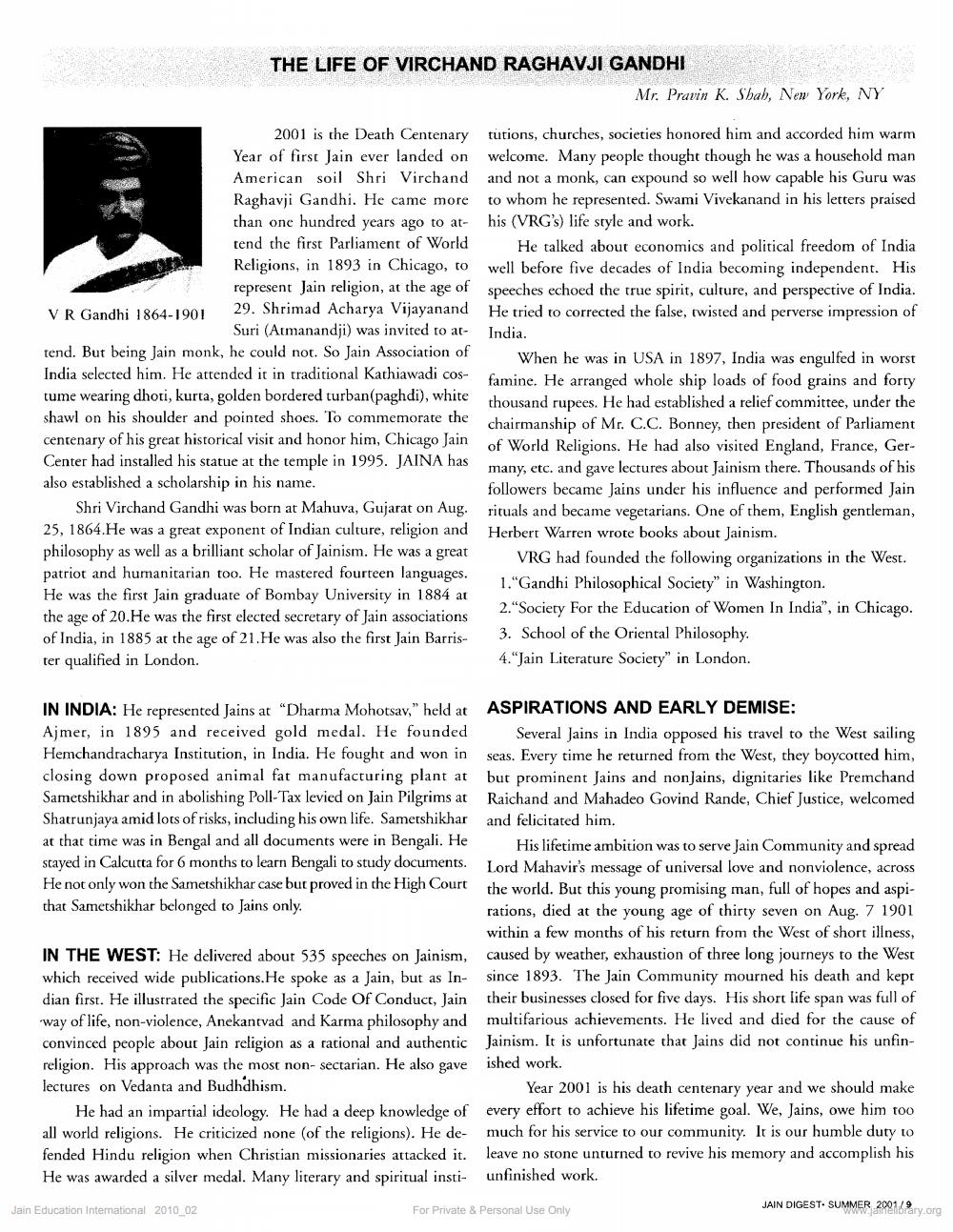________________
THE LIFE OF VIRCHAND RAGHAVJI GANDHI
2001 is the Death Centenary Year of first Jain ever landed on American soil Shri Virchand Raghavji Gandhi. He came more than one hundred years ago to at tend the first Parliament of World Religions, in 1893 in Chicago, to represent Jain religion, at the age of 29. Shrimad Acharya Vijayanand Suri (Atmanandji) was invited to attend. But being Jain monk, he could not. So Jain Association of India selected him. He attended it in traditional Kathiawadi cos
VR Gandhi 1864-1901
tume wearing dhoti, kurta, golden bordered turban (paghdi), white shawl on his shoulder and pointed shoes. To commemorate the centenary of his great historical visit and honor him, Chicago Jain Center had installed his statue at the temple in 1995. JAINA has also established a scholarship in his name.
Shri Virchand Gandhi was born at Mahuva, Gujarat on Aug. 25, 1864.He was a great exponent of Indian culture, religion and philosophy as well as a brilliant scholar of Jainism. He was a great patriot and humanitarian too. He mastered fourteen languages. He was the first Jain graduate of Bombay University in 1884 at the age of 20.He was the first elected secretary of Jain associations of India, in 1885 at the age of 21.He was also the first Jain Barrister qualified in London.
IN INDIA: He represented Jains at "Dharma Mohotsav," held at Ajmer, in 1895 and received gold medal. He founded Hemchandracharya Institution, in India. He fought and won in closing down proposed animal fat manufacturing plant at Sametshikhar and in abolishing Poll-Tax levied on Jain Pilgrims at Shatrunjaya amid lots of risks, including his own life. Sametshikhar at that time was in Bengal and all documents were in Bengali. He stayed in Calcutta for 6 months to learn Bengali to study documents. He not only won the Sametshikhar case but proved in the High Court that Sametshikhar belonged to Jains only.
IN THE WEST: He delivered about 535 speeches on Jainism, which received wide publications. He spoke as a Jain, but as Indian first. He illustrated the specific Jain Code Of Conduct, Jain way of life, non-violence, Anekantvad and Karma philosophy and convinced people about Jain religion as a rational and authentic religion. His approach was the most non- sectarian. He also gave lectures on Vedanta and Budhdhism.
He had an impartial ideology. He had a deep knowledge of all world religions. He criticized none (of the religions). He defended Hindu religion when Christian missionaries attacked it. He was awarded a silver medal. Many literary and spiritual insti
Jain Education Intemational 2010_02
Mr. Pravin K. Shah, New York, NY
tutions, churches, societies honored him and accorded him warm welcome. Many people thought though he was a household man and not a monk, can expound so well how capable his Guru was to whom he represented. Swami Vivekanand in his letters praised his (VRG's) life style and work.
He talked about economics and political freedom of India well before five decades of India becoming independent. His speeches echoed the true spirit, culture, and perspective of India. He tried to corrected the false, twisted and perverse impression of India.
When he was in USA in 1897, India was engulfed in worst famine. He arranged whole ship loads of food grains and forty thousand rupees. He had established a relief committee, under the chairmanship of Mr. C.C. Bonney, then president of Parliament of World Religions. He had also visited England, France, Germany, etc. and gave lectures about Jainism there. Thousands of his followers became Jains under his influence and performed Jain rituals and became vegetarians. One of them, English gentleman, Herbert Warren wrote books about Jainism.
VRG had founded the following organizations in the West. 1. Gandhi Philosophical Society" in Washington. 2."Society For the Education of Women In India", in Chicago. 3. School of the Oriental Philosophy. 4. "Jain Literature Society" in London.
ASPIRATIONS AND EARLY DEMISE:
Several Jains in India opposed his travel to the West sailing seas. Every time he returned from the West, they boycotted him, but prominent Jains and nonJains, dignitaries like Premchand Raichand and Mahadeo Govind Rande, Chief Justice, welcomed and felicitated him.
His lifetime ambition was to serve Jain Community and spread Lord Mahavir's message of universal love and nonviolence, across the world. But this young promising man, full of hopes and aspirations, died at the young age of thirty seven on Aug. 7 1901 within a few months of his return from the West of short illness, caused by weather, exhaustion of three long journeys to the West since 1893. The Jain Community mourned his death and kept their businesses closed for five days. His short life span was full of multifarious achievements. He lived and died for the cause of Jainism. It is unfortunate that Jains did not continue his unfinished work.
Year 2001 is his death centenary year and we should make every effort to achieve his lifetime goal. We, Jains, owe him too much for his service to our community. It is our humble duty to leave no stone unturned to revive his memory and accomplish his unfinished work.
For Private & Personal Use Only
JAIN DIGEST SUMMER 2001/9
www.jamembrary.org




